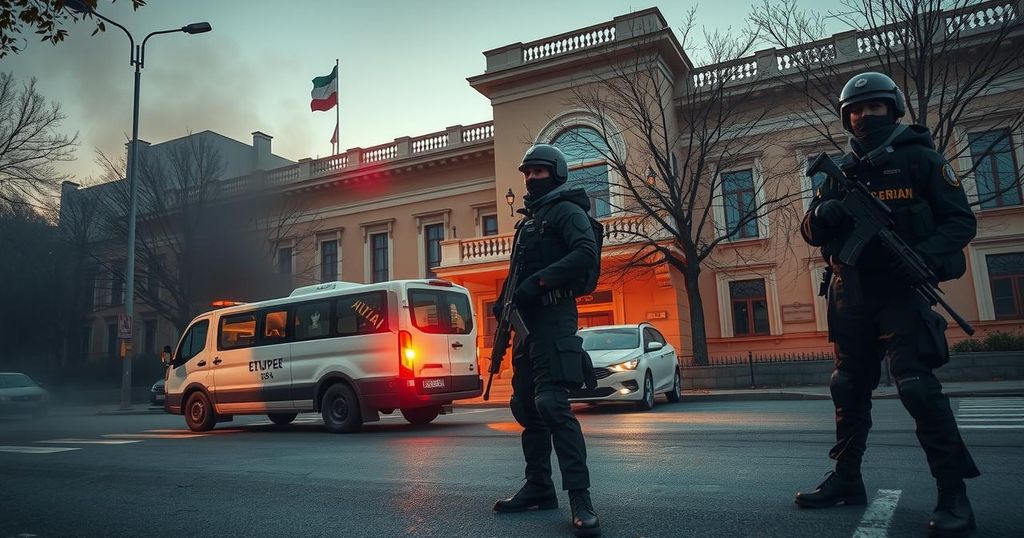World news
AL - ARABIYYA, ASIA, ASS, ASSAD, ASSASSINATION, BASHA, CONFLICT, DAMASCUS, EUROPE/ASIA, FOREIGN MINISTRY, IRAN, KREMLIN, MIDDLE EAST, MIDEAST, MILITARY OPERATIONS, MOHAMMAD GHAZI AL - JALALI, RUSSIA, RUSSIAN FOREIGN MINISTRY, STATE TV, SYRIA, SYRIAN CIVIL WAR, WAR
Jamal Abdullah
0 Comments
Political Turmoil as Gunmen Storm Iranian Embassy Following Assad’s Departure
A group of gunmen attacked the Iranian embassy in Damascus following the reported escape of Bashar Assad, amid significant political upheaval as Islamist rebels successfully challenged Assad’s regime. Russia claimed Assad had left Syria with instructions for a peaceful power transfer, prompting celebrations across Damascus. The situation underscores the shifting political landscape in Syria, raising concerns about the future direction of governance under Islamist forces such as Hayat Tahrir al-Sham.
On Sunday, a group of unidentified assailants stormed the Iranian embassy in Damascus amidst significant political upheaval following the overthrow of Bashar Assad’s regime by Islamist rebels. Reports indicate that the attackers were not affiliated with the primary rebel faction, Hayat Tahrir al-Sham (HTS), which has made substantial territorial gains recently. Footage from inside the embassy showed the assailants searching through documents and damaging property.
As the city fell to rebel forces, Iranian state media reported that many Iranian officials had been evacuated, leaving only a few diplomats behind. Syrian television subsequently reported that Assad and his family fled the capital, with their current location still unknown. Meanwhile, Russia’s Foreign Ministry claimed that Assad had departed Syria following negotiations with rebel factions and had left behind instructions for a peaceful transfer of power.
Large crowds gathered in central Damascus to celebrate the reported departure of Assad, with many expressing their joy through chants against his regime and celebratory gunfire. The collapse of Assad’s long-standing rule marks a potentially pivotal moment in the ongoing Syrian civil war, which has lasted nearly 14 years and has significantly altered the political landscape of the Middle East. Abu Mohammed al-Golani, the leader of HTS, emphasized a restrained approach among his fighters as he seeks to establish influence over the region while maintaining public order.
In light of these recent developments, experts have voiced concerns about the intentions of HTS, noting its connections to radical Islamist ideologies and foreign powers. Syrians remain watchful amid the changing dynamics of this protracted conflict, with the future governance of Syria now uncertain as the nation’s political fabric undergoes significant transformation.
The Syrian civil war, which began in 2011, is characterized by complex interplays of domestic discontent and foreign support for various factions, including Islamist groups. The regime of Bashar Assad has relied heavily on allies such as Iran and Russia, which have provided military and political backing throughout the conflict. The rise of groups like HTS reflects the shifting alliances and power struggles within Syria, further complicating the road towards peace and stability. The recent escalation of violence and political upheaval, marked by Assad’s reported flight, heralds a significant turn in this long-standing conflict.
The storming of the Iranian embassy in Damascus amid the reported ousting of Bashar Assad is emblematic of the rapid changes occurring within Syrian politics. The involvement of Islamist groups such as HTS raises alarms about the future governance of Syria, indicating a potential shift towards radical Islamist control. As the world observes, the implications of Assad’s departure could reverberate throughout the Middle East, suggesting profound consequences for regional dynamics and governance.
Original Source: www.foxnews.com




Post Comment